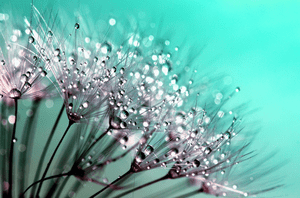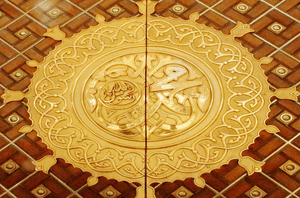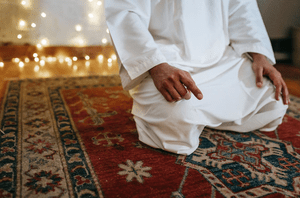To attain khushūʿ, you have to push yourself to stop sinning by protecting your organs; in particular your eyes, tongue, and heart. Safeguard your eyes against looking at ḥarām, whether online or offline. Stop your tongue from backbiting, slandering, swearing, obscene language and saying hurtful things. Keep good company who will help you to protect yourself. Protect yourself from eating ḥarām food, including that which is earned from unlawful means.
The īmān in your heart has a special nūr (light). The more nūr the heart has, the greater the nūr of your actions and words will be. Ibn al-Qayyim (raḥimahullāh) explains that there are some believers whose actions ascend up to Allah (subḥānahū wa taʿālā), and the nūr of their deeds is like the light of the sun. It shines brightly with the nūr from their hearts. The nūr will keep them steady on the ṣirāṭ (bridge over Hell-fire) and will guide them to Paradise. Of the various deeds, ṣalāh in particular is a ‘nūr’ as stated by the Prophet ﷺ (Muslim).
Ṣalāh brings nūr in your heart; nūr in your face; nūr in your grave and nūr in the hereafter. Observe those who pray with complete khushū. You will notice that these people have abundant nūr on their faces. This is the same nūr which illuminates the heart and opens the doors of maʿrifah (knowledge) of Allah al- Nūr (The Ultimate Light). It is this nūr that also helps you to enjoy the sweetness of worship.
Rust on Hearts
This ‘nūr’ of the heart is extinguished through sins, especially the sins of the eyes. The sins block goodness and nūr from penetrating into the heart. This is why the Messenger of Allah ﷺ said, “Verily, when the slave commits a sin, a black dot appears on his heart. When he desists, seeks forgiveness and repents, his heart is polished clean. But if he sins again, it increases until it covers his heart. And that is the rān (rust) which Allah mentioned: ‘No indeed! Rather what they have been doing has rusted their hearts (83:14)’” (Tirmidhī).
Ibn Rajab (raḥimahullāh) explains that the accumulation of rust on their hearts veils them from His maʿrifah (knowledge and deep awareness of Him), thereby, preventing them from becoming acquainted with Him. It hinders them from having vigilance (murāqabah) of Him (subḥānahū wa taʿālā), being mindful of Him and being aware of His presence in this world. The consequence of their hearts being veiled in this world is that they will be ‘veiled’ and blocked from seeing Him in the next. Hence why Allah says in the next āyah, “No indeed! They will surely be veiled on that Day from their Lord” (83:15).
“Do not be of those who curse Shayṭān in public, and obey him in private.” – ʿUmar b. ʿAbdul-ʿAzīz (raḥimahullāh)
Sin after sin turns the heart into a sieve, preventing it from holding goodness. Unless you seek forgiveness and make sincere repentance, your heart will die. In this manner, praying ṣalāh with khushūʿ will become impossible, because a ‘dead’ heart cannot humble itself nor submit to its Master (ʿazza wa jall).
Fighting your nafs and subjugating it is essential to attaining khushūʿ in ṣalāh. Ibn al-Qayyim (raḥimahullāh) explains that for a servant to remain present in his ṣalāh and to be occupied with his Lord, he must overcome his lust and desires. He asks, ‘How can a heart – which is overcome by lust, captivated by desires, and is a stronghold of shayṭān – be saved from whispers and distractions?’
Lowering the Gaze
We should lower our gazes and stay away from looking at anything which incites lust, especially when we are browsing the internet. This includes being very selective of who we follow on social media. Likewise, we should lower our gazes when we are outside the home, walking in the streets and in the workplace.
Al-Rabīʿ b. Khuthaym (raḥimahullāh) was so strict in keeping his gaze lowered that some people thought he was blind. For twenty years, he was a regular visitor to the house of ʿAbdullāh b. Masʿūd (raḍiy Allāhu ʿanhu). Whenever the maidservant would see him, she would remark to Ibn Masʿūd, “Your blind friend has come,” and Ibn Masʿūd (raḍiy Allāhu ʿanhu) would laugh at her remark. When Rabīʿ would knock on the door, the maidservant would go out and see him, head down and with his gaze lowered. When Ibn Masʿūd (raḍiy Allāhu ʿanhu) would see Rabīʿ, he would say, quoting the Qur’ān, “‘And give good news to the humble.’ (22:34). If Muḥammad ﷺ had seen you, he would have loved you.”
Three Benefits of Lowering the Gaze
Ibn al-Qayyim (raḥimahullāh) explains the benefits of lowering the gaze:
1. Tasting the sweetness and joy of īmān. This sweetness is far greater than the sweetness of what you averted your gaze from, because when you give up something for the sake of Allah (subḥānahū wa taʿālā), He replaces it with something far better.
2. The heart becomes illuminated, thereby increasing your insight (firāsah) as you are able to see through the light (nūr) of your heart what others cannot see.
3. It strengthens the heart, makes it steadfast, and makes one courageous.






